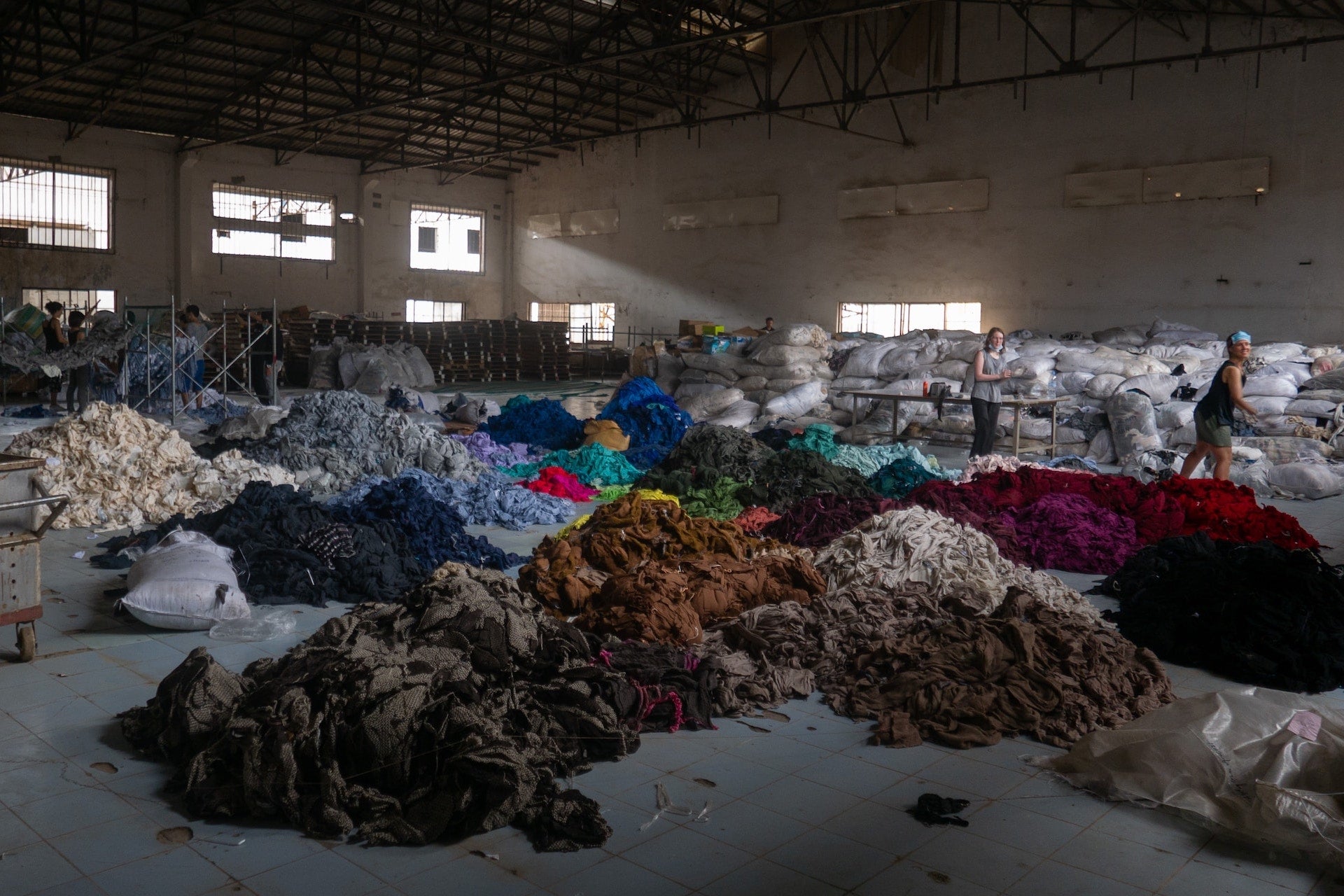It’s time for a round-up of some of the finest sustainable fashion stories that hit the news in April…

#RanaPlaza10YearsOn
On 24 April 2013, the collapse of the Rana Plaza building in Dhaka, Bangladesh, which housed five garment factories, killed 1,134 people and injured many more. It seemed like a seminal moment at the time but it’s worth asking how much has truly changed?
There have been improvements in factory safety standards since, with an article from The Guardian stating that there were “nearly 56,000 safety inspections across more than 2,400 garment factories in Bangladesh and more than 140,000 safety improvements made”. Brands have committed funds to factory renovations and a compensation fund for the victims of this tragedy. There has been work done to expand the safety accord to other countries such as Pakistan although the article notes that inspections are yet to start there.
Some brands including Levi’s, Gap, Walmart and Amazon have yet to sign up to the Bangladesh factory safety deal. While these brands claim to help workers in other ways, it is noticeable that pay remains low relative to worker demands (the garment sector minimum wage in Bangladesh is reviewed every 5 years) and that workers can be harassed for being part of a union. Factory owners meanwhile appear to be treated outside of reasonable business practices by brands with late payments, cancelling or reducing orders with limited notice cited as examples.
Evidently, there’s still a long way to go - and these activists made their voices heard:
Today we took to the streets to mark #RanaPlaza10YearsOn. In grief we remembered the lives of 1138 garment workers, mainly young women, killed by the factory collapse. In rage we called out the fashion brands with blood on their hands. #RanaPlazaNeverAgain
— Labour Behind The Label (@labourlabel) April 23, 2023
📷insta@protests_photos pic.twitter.com/gMayH1jiMa
Repairing reputations
Reuters is reporting that retailers will be discussing plans to move to more sustainable practices at the World Retail Congress. With high inflation reducing consumer spending alongside incoming EU regulations on textile waste, retailers are looking at how to protect revenues and margins.
We were therefore interested to learn that H&M, Zara and Uniqlo have started selling garment repair services at some of their stores. We say this because in our article on Sustainable Fashion trends to look out for in 2023 we predicted that there will be more opportunities to repair.
While that is a good thing, those looking into these repair services have noted an issue or two: the prices are a large percentage of the value of the item being repaired. This means that people may still opt to buy a replacement rather than repair. It would seem after all that repair costs are comparatively high.
We live in hope nonetheless that (learning how to) “repair” will indeed be a trend.
Sustainable fulfilment
To be clear, we’re talking about fulfilment as in deliveries rather than the feeling of pleasure and satisfaction because you are happy with your life. Although, to be fair there’s nothing wrong with feeling fulfilled because your deliveries are sustainable. In fact, this is important enough for half of UK consumers, so much so that they would support an online delivery tax if it were levied to carbon-offset fuel emissions to improve the sustainability credentials of e-commerce.
This is according to a survey of 1,000 consumers carried out on behalf of the Retail Technology Show. The survey found that some 67% of consumers believe that making fulfilment carbon-neutral was one of the main ways retailers could improve green retailing, with 50% now in support of online retailers being taxed to offset carbon emissions generated from deliveries.
Do you know what else the survey found? Some 71% of consumers cite repair services as a key area for improving sustainability. We’ll say no more.
Recycled socks from Smartwool
Talk about timing! This Earth Day 2023, Smartwool released its first circular sock: the Second Cut™ Hike Sock. It provides the same comfort and performance of the brand’s original hike sock, while being its eco-friendly companion. They’re made of 50% virgin Merino wool and 50% recycled material, collected through Smartwool’s take-back program: the Second Cut Project.
To recycle the old socks for Second Cut, Smartwool partnered with pioneering manufacturing facility Material Return. The new material is also certified by ZQ, to guarantee sustainable, ethical and traceable Merino wool.
Did you know that people are able to send in their stinky old socks to Smartwool? All brands are welcome but, of course, only old Smartwool socks are used for the Second Cut™ Hike Sock. Everything else is reprocessed with Material Return to go towards other products - never ending up in an odorous landfill site.
The UK's first responsible denim wash facility
From socks to jeans. Blackhorse Lane Atelier (BLA) launched the UK’s first sustainable denim wash facility this April. The Blackhorse Lane Denim Wash Lab and Innovation Hub features state-of-the-art machines, made by Italian company Tonello. Tonello is known for its work around sustainable production, improving technology while reducing environmental impact. In the case of the BLA hub, the denim washing system achieves a significant water reduction compared to the typical process.
Not only that, the facility acts as a learning resource. Creative professionals and students can access it to research and develop new sustainable ways of working with denim. Aside from facilitating production capabilities within the UK, the initiative strengthens creativity and a sense of community within the local fashion scene - another noble goal of factory owner Bilgehan Ates.
BLA makes and sells its own line of craft, organic, raw-denim jeans, to complement its garment manufacturing services.
Coach launches a sub-brand focused on circularity
The American fashion brand just launched its sustainable sub-brand called Coachtopia. Best known for accessible luxury leather goods, Coach announced last year that it would be repositioning itself as “expressive luxury”. This fancy new direction puts the focus on sustainably-minded Gen Z customers to bring in more revenue.

It’s also about getting people together. Coachtopia is being built as a platform for collaborative creativity, driven mainly by today’s youth.
Major brands branching out into sustainability with sub-brands is quite a trend now. But we must remember that the often-behemothic brand overall must become more sustainable too. Otherwise it’s a bit short-sighted!
Anyway, Coachtopia is now available in the US, Canada, and the UK.
That’s quite enough for this month but great to see so many positive moves in the sustainable fashion industry. We’ll be back next month with another top selection. See you in a few weeks!




